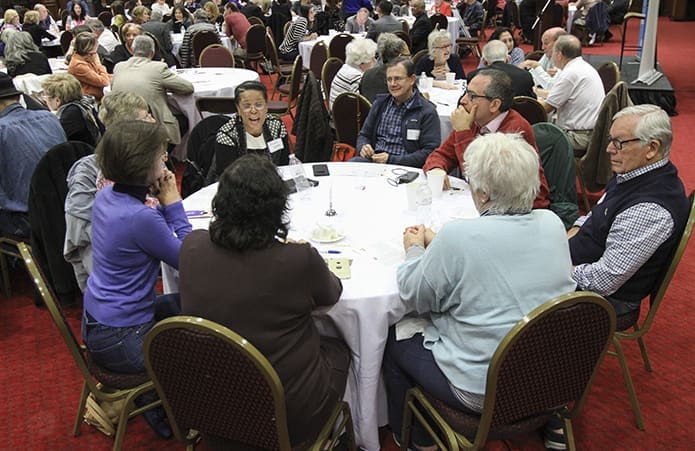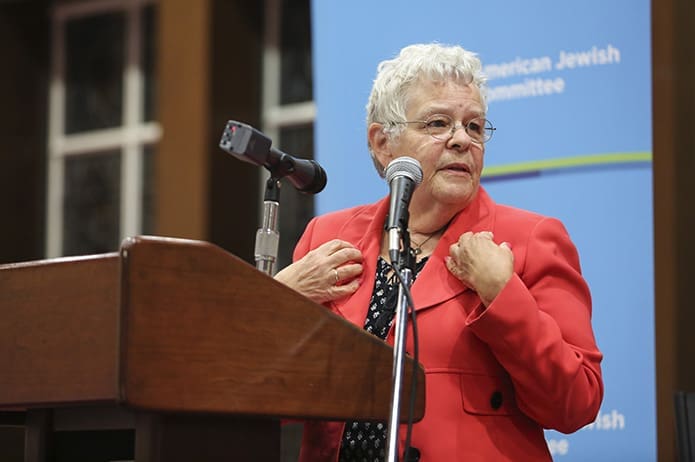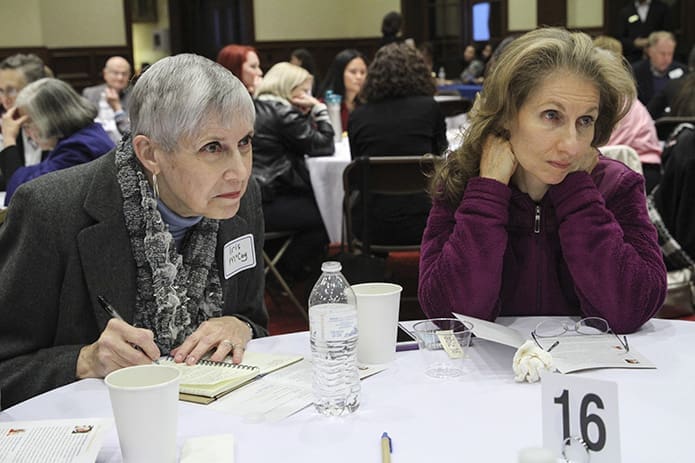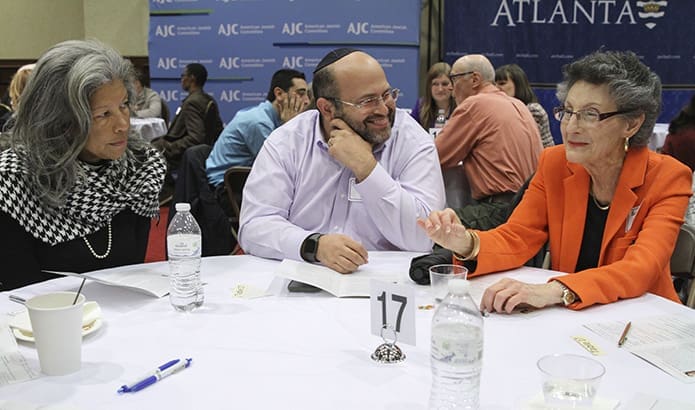After the evening’s speakers weighed in, over 200 people of different faiths and backgrounds had a chance to discuss the things that unite each other. "Repairing the World" was held Oct. 25. Photo By Michael Alexander
Atlanta
Atlanta’s Jewish and Catholic communities discuss finding unity in diversity
By ANDREW NELSON, Staff Writer | Published November 1, 2018
ATLANTA—Days before a gunman attacked the Tree of Life synagogue in Pittsburgh, Pennsylvania, more than 250 women and men of Christian and Jewish faiths focused on building unity in a divided society.
The gathering on Thursday, Oct. 25, called Repairing the World, is the fourth annual event bringing together the two faith communities, organized by the Archdiocese of Atlanta and the American Jewish Committee, Atlanta chapter.
Following the attack on Saturday, Oct. 27, which killed 11 worshippers, Archbishop Wilton D. Gregory expressed his support for the Jewish community.
“The people of the Archdiocese of Atlanta extend our sincere and heartfelt support to our Jewish brethren in Pittsburgh and beyond whose peace and serenity were stolen by those acts of brutality today. We want them to know of our love and closeness in faith. Hatred will never win,” said Archbishop Gregory on Twitter.
The Atlanta tradition of an annual celebration with the people of the two faiths started with the 50th anniversary of the Vatican II proclamation, “Nostra Aetate.” Issued in 1965, the document reset relations between the Catholic Church and other world religions. This year, Holy Spirit Church, Atlanta, hosted the event.
During the evening, Archbishop Gregory said the challenges of injustice and division must be identified, however, the work should not leave people feeling helpless.
“We need to be people of hope. We don’t want to be overwhelmed by all the things that are not going well,” said the archbishop.
There are many people working for justice and whose efforts make this a better community, he said.
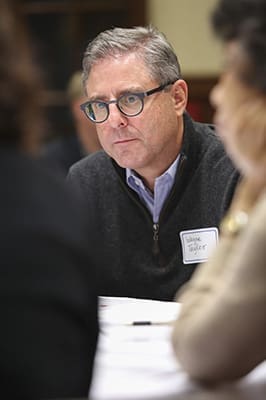
Wayne Taylor, a member of Temple Sinai, Sandy Springs, and vice president of the Atlanta chapter of the American Jewish Committee, attended the evening of dialogue between those from Catholic and Jewish faith traditions. Photo By Michael Alexander
Rabbi Bradley Levenberg and Adrian Dominican Sister Mary Priniski spoke from their faith traditions about standing with people on the margins.
Rabbi Levenberg serves at Temple Sinai, Sandy Springs. He is active in the Camp Coleman Clergy Advisory Board and the Atlanta Jewish Film Society. He was recently inducted into the Morehouse College Martin Luther King Jr. Chapel Board of Preachers.
“God stopped creating the world when 99 percent of it was done,” said Rabbi Levenberg. “God left the final one percent of creation—the problem-fixing percent—to us.”
When people see brokenness, we are tasked to fix it, he said. It is integral to Jewish tradition, this fixing of problems, he said.
“We are commanded in our sacred Scripture to care for the needy, to support the fallen. We channel our experiences as refugees to welcome the stranger, for as Scripture states that we were strangers in the land of Egypt,” said the rabbi.
He shared the story of Rabbi Jacob Rothschild, the spiritual leader of The Temple, Atlanta, a critic of segregation starting in the 1940s. White opponents of civil rights bombed the Peachtree Street synagogue during his leadership.
“We must reach out to our friends when their community feels threatened because when it comes down to it, far too many of us have privilege that we are not willing to use,” he said.
Sister Mary shared the history of Catholic social teaching, starting with the book of Genesis.
Catholics’ concern for charity and standing for justice is rooted from “that very first creation,” she said.
“We’ve been faced with horrific acts of violence,” she said. “We do that violence when we regard the other, who doesn’t think like we think, or doesn’t talk like we talk, as not quite human. Because if we really regarded them as human, we couldn’t do that. We couldn’t rip children from their mothers. We couldn’t send a pipe bomb through the mail. We couldn’t take away people’s Social Security. We couldn’t take away their health care.”
Sister Mary has served with social justice ministries, including as coordinator of Connective Ministries, director of the Commission on Justice of the Glenmary Home Missioners, and executive secretary of the Labor Guild of the Archdiocese of Boston. She recently marked her 50th anniversary as a religious sister with the Adrian Dominicans community.
In modern time, the church’s teaching on social justice started with the papal encyclical “Rerum Novarum,”issued in 1891. Since then Sister Mary said popes will periodically release documents examining current human development through the lens of the faith.
“We bring to our struggles together the faith lessons we’ve been taught by our different faith backgrounds. We are people of action, based on our faith, based on the lessons that we’ve been taught by those upon whose shoulders we stand. Those lessons in faith carry us and will confront us and challenge us to make choices, not just for ourselves,” she said.
A half dozen participants sat at each table to share insights and feelings on three questions: How has your faith taught you the meaning of righteousness, compassion, and justice? What struggles do you experience reaching out to those on the other side of the divide? What actions can we take to promote unity in our greater community?
For nearly 45 minutes, a low buzz filled the room as the women and men answered the questions and listened to each other. In the end, the people sitting around the tables were encouraged to share contact information and consider inviting each other to talk informally over a meal and get to know each other.
Jessie Cassar, a member of the Cathedral of Christ the King, said she grew up among a diversity of people living outside the United States so she enjoys hearing from people of other faiths.
She’s learned once you get past labels, people share more similarities than differences. It starts with dialogue, said Cassar.
Father Urey Mark, the chaplain at the Lyke House Catholic Center at the Atlanta University Center, said he enjoys listening to others to reflect on his Catholic faith. As he sat with a table of mostly Jewish women, he said he appreciated how they spoke of the Torah, the first five books of Scripture, and he knew they talked about the foundation of the life of Jesus.
“We are on the journey now. We need to be allowed to listen to each other,” he said. “There is so much that brings us together.”
